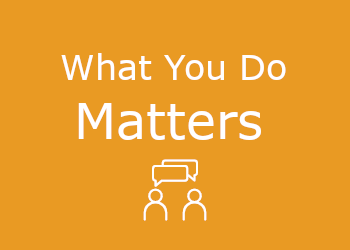What You Do Matters

Creating a working and learning environment that is truly welcoming, inclusive, and equitable for everyone requires that we all do our part to speak up and actively discourage acts of harassment, microaggression, and discrimination. By doing so, we are taking a stand, advocating for and protecting our colleagues and friends, particularly those from underrepresented backgrounds.
At DPHS, 21% of employees witnessed what felt like acts of discrimination, and 29% witnessed what felt like acts of microaggression against someone else in 2020.1 We each must do our part to address this problem. In individual, team, or large group interactions, if you experience an incident in which someone accidentally or purposely makes an offensive statement, microaggression or discriminatory action, we recommend the following framework to initiate effective dialogue:
- Discern: Assess the situation carefully and evaluate the potential impact of their words or action. Recognize the signs of discriminatory or microaggressive language. 2, 3
- Don't Deflect: Acts of microaggressions and discrimination may sometimes be subtle, but over time can have serious negative impacts on the physical and psychological wellbeing of under-represented minorities, ultimately undermining a culture of inclusion and contributing to a toxic environment. What you do matters
- Deter: Be prepared to discuss with the person who committed the microaggression/ discrimination. Engage in conversation and explain that what they said or did was uncomfortable for you and get to the root of their behavior.
- Describe: Challenge the individual to clarify their statement or action using probing questions, such as ‘How do you mean that?’ Reframe the conversation around the impact of the behavior, how you interpreted their action and why. Intent does not supersede impact, clarify how their words or behavior can have negative impacts.
- Decide: Examine what you will take away from the interaction and what the next steps are. Review the DPHS professionalism plan for resources to help address the issue, or use it to consider next steps if you do not feel comfortable addressing the situation directly.
1 Microaggressions are “brief & commonplace daily verbal, behavioral, or environmental indignities, whether intentional or unintentional, that communicate hostile, derogatory, or negative slights and insults.” (Sue, D. W., Capodilupo, C. M., Torino, G. C., Bucceri, J. M., Holder, A. M. B., Nadal, K. L., & Esquilin, M. (2007). Racial microaggressions in everyday life: Implications for clinical practice. Amer-ican Psychologist, 62(4), 271-286. DOI: 10.1037/0003-066X.62.4.271
2https://hbr.org/2020/07/when-and-how-to-respond-to-microaggressions